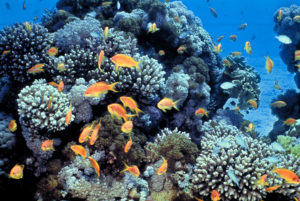 It’s common knowledge that coral reefs are a delicate and beautiful ecosystem. However, beyond the obvious dangers like pollution, overfishing, and invasive species, there’s one unexpected threat doing untold amounts of damage–sunscreen. In Hawaii, a bill has just been passed by the state legislature banning reef-polluting sunscreens. If governor David Ige signs the bill, Hawaii will become the first state to ban these chemicals. The ban will come into effect on January 1st of 2021 (https://www.huffingtonpost.com/entry/hawaii-ban-sunscreen-chemicals_us_5ae93604e4b022f71a02fc48).
It’s common knowledge that coral reefs are a delicate and beautiful ecosystem. However, beyond the obvious dangers like pollution, overfishing, and invasive species, there’s one unexpected threat doing untold amounts of damage–sunscreen. In Hawaii, a bill has just been passed by the state legislature banning reef-polluting sunscreens. If governor David Ige signs the bill, Hawaii will become the first state to ban these chemicals. The ban will come into effect on January 1st of 2021 (https://www.huffingtonpost.com/entry/hawaii-ban-sunscreen-chemicals_us_5ae93604e4b022f71a02fc48).
The two sun-blocking chemicals targeted are octinoxate and oxybenzone. Their toxicity prevents young coral from developing by damaging their DNA and exacerbates bleaching, draining reefs of their color and vibrancy. With Hawaii’s robust tourism industry, the volumes of sunscreen washing across reefs are not to be underestimated. The Haereticus Environmental Laboratory (http://markets.businessinsider.com/news/stocks/haereticus-lab-study-finds-sunscreen-pollution-threatens-hanauma-bay-in-hawaii-1021508230) calculated that at Hanauma Bay 412 pounds of sunscreen washed into the ocean off of 2,600 visitors on a single day. Around the world, over 14,000 tons of these chemicals are absorbed by reef ecosystems, stunting their growth and beauty while upsetting the health of marine life. To protect the reef is to protect Hawaii’s economy.
Even without dipping a single toe into the water, octinoxate and oxybenzone could be causing damage to the ocean and the life it supports. After spending time outdoors and wearing sunscreens containing these chemicals, taking a shower at home rinses sunscreen off of your body and into water treatment systems, eventually making its way back out to sea (http://fortune.com/2018/05/02/hawaii-ban-sunscreen-coral-reefs/).
While the bill has widespread support, some worry it will discourage people from wearing sunscreen at all, leading to higher rates of skin cancer (http://www.civilbeat.org/2018/04/banning-many-sunscreen-products-will-increase-skin-cancer-risk/). With its location on the equator, beachside activities, and ecotourism, Hawaii is absolutely a location where adequate protection from the sun is a must. Those in favor of the bill recommend switching from the toxic chemical sunscreens being banned to physical sunscreens like titanium oxide or zinc oxide. There is also UV-resistant clothing available from several companies, as well as the classic wide-brimmed sunhat (https://www.buzzfeed.com/mbvd/toxic-ingredients-in-sunscreen-are-killing-coral-reefs-and?utm_term=.gmwyKw8N6#.nvk6JQXAY).


